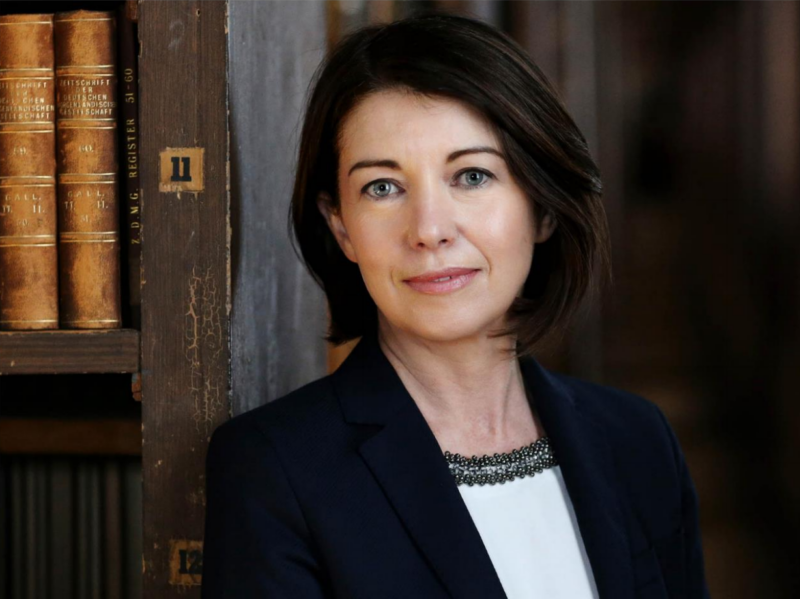Prof Linda Hogan was the last of the provostial candidates to take part in the Q&A sessions on Instagram run by The University Times this evening, shortly after the IFUT hustings.
Hogan faced a wide range of questions regarding her plans if elected Provost, including the significance of making climate change a priority, staying committed to projects currently underway and establishing new scholarship opportunities for prospective undergraduate students.
Commitment to on-going projects
When asked about some of the on-going projects spear-headed by the current Provost and whether she would review them, Hogan said she would from the get-go while also commencing new ones which have not been seen as a priority.
Hogan hastened to add, however, that with projects, such as the E3 Institute, where Trinity has already engaged with government and their philanthropic partners, pulling the plug would cause significant damage to their reputation in terms of trust. Hogan added that reneging on these commitments could have negative repercussions for attracting philanthropy and government funds for other projects such as the Cancer Institute.
“One of the things that concerns me a lot is the impact that the discussion through the Provost elections may have on the confidence that our donors have in how Trinity engages with them”, Hogan said.
Climate and Biodiversity
While Hogan is the only candidate to commit to a Trinity campus with net-zero emissions by the end of her term, it was put to her this evening how she intends to balance this ambition with her other goal of placing Trinity in the top-50 world rankings given that climate is not an indicator that is currently used.
Hogan said, however, that she has “absolutely no doubt” that how a university performs in terms of climate will be a pillar for how the rankings are determined in 10 years. She added that indicators for the rankings have been constantly evolving since they were introduced roughly 15 years ago.
Hogan was also keen to underline, however, that College needs to tackle climate change irrespective of rankings, describing it as an “ethical and moral imperative”.
“It’s irrelevant, it’s actually about what we do and the kind of contribution we make to the well-being of future generations. That’s the key”, Hogan said.
Leaving certificate reform
Hogan also outlined her desire to see the leaving certificate reformed rather than kicked to the curb, saying that it needs to be made more fit for purpose so that at “third level we would have much more diverse pedagogy”.
Hogan cited a pilot program which she worked on with Prof Patrick Geoghan while she was Vice-Provost that widened the scope of entry requirements for students applying to certain courses to include their performance relative to their school as well as a statement of interest for their chosen program.
Hogan dismissed the idea of throwing away the leaving certificate and moving to a system similar to the US, which she described as far too costly given that “armies of people are assessing potential students” and that it can often prioritize the most privileged, noting the recent college application scandal in the US.
The Future of Scholarships
In a conversation centred on Foundation Scholarships (Schols), Hogan revealed that she was open to discussing them, pointing out that “it is always prudent to ask does this institution meet the objectives it was set out to”. She highlighted how Schols provides the chance for students to be tested on a particular set of skills and provides them with an opportunity that she wishes to preserve.
In a more unorthodox statement, Hogan revealed how she believed there was a second question on the cards regarding scholarships, noting that there should be more opportunities early on for students to allow them to come to Trinity. Aiming this proposal at fifth and sixth-year secondary school students, she indicated that such a scheme would go some way in reducing “perceived inequality”.
Hogan emphasised the need to provide “another gate” for student, underlining her views on inclusion and diversity. “We have very, very few scholarships in that way and that’s where we need to break the barriers”, she said.
Harder approach to the governance bill
This evening Hogan took a firmer stance on the subject of the College Governance bill. Hogan reaffirmed her belief that the Provost should not hold the role of chair of Board and noted that it was “frustrating and unacceptable” that the government wished to pursue a smaller, appointed board due to the notion that it is a better form of governance.
Hogan said that “small boards appointed from a small cohort of people creates group think”. Detailing her five years of experience on the Board, Hogan strongly advocated for the current form of College governance as she noted how it had “served the College very well”.







